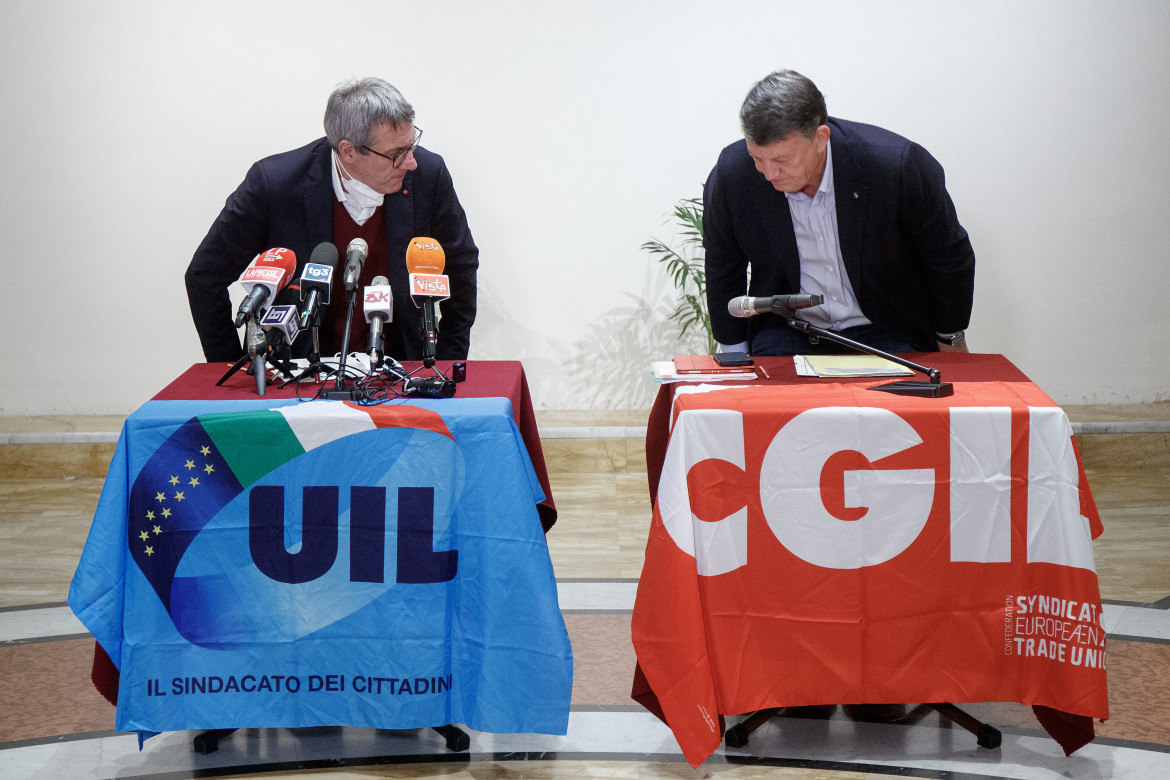Commentary
Now the strike must become truly general
The strike’s importance partly lies in dispelling a false narrative that has been used by governments throughout the pandemic, that only a lack of social conflict can guarantee a recovery. Historically, the opposite has been true.

Social conflict now returns to center stage, in one of its highest forms: a national general strike. Since CGIL and UIL called it, criticism and attacks of all kinds have rained down: an “unjustified strike,” “unreasonable,” “irresponsible” (in this case, more for its proximity to Christmas than due to the pandemic).
The still waters in which the Draghi government had been sailing have turned into a storm.
The strategy to get unified union support based on the lowest common denominator could not withstand the impact of an economic rebound—not “recovery,” if we want to keep to the exact meaning of the words—built on a social fabric stressed by unemployment, precariousness, youth and female joblessness, low wages and the growth of inequalities between the North and South, destined to undermine the unity of the country if the differentiated autonomy linked to the Budget Law is actually implemented.
It has been said that unity by itself is not a proof of the uniqueness of the occasion. True, but it’s certainly the case that the fracture between the unions does not look like it can be easily healed, despite the agreement on smart working. Proof of this is the choice by CISL to convene for December 18 a counter-protest that would be “responsible and constructive,” aiming to “improve the contents of the budget law.” But the majority government is committed, for instance, to abolishing the ceiling of €25,000 in household income for the 110% superbonus for single-family houses. It’s not exactly an improvement in the interest of those who occupy the lowest rungs of the social ladder.
Without opening a wide conflict, there will be no improvements. Of course, this strike has also been accused of being political. Our memory takes us back to another general strike, called by Fiom alone 20 years ago, on November 16, 2001. Fim and Uilm had concluded a separate agreement with Federmeccanica, without submitting it to a workers’ vote. Fiom did the opposite, collecting 351,145 signatures against the separate agreement. In a sunny Piazza San Giovanni, filled up to overflowing during the mild Roman fall, Claudio Sabattini, Fiom’s general secretary, caught everyone off guard by saying outright that every general strike is political, in the noblest sense: a time when the working class takes on the problems of democracy and a different path for development of the country. And that’s what will happen on December 16.
Its importance also lies in dispelling a false narrative that has been used by governments throughout the pandemic, that only the lack of social conflict can guarantee a recovery. Historically, the opposite has been true. The reconstruction of our country in the last post-war period took place in the midst of, and thanks to, social conflict, acute and widespread, aggravated by the toll in human lives of workers and peasants who fell victims to the repression. And today, conflict is indispensable, although, we hope, without the bloody clashes of those times, so that the post-pandemic period won’t start again from the point it left off. So that the crisis is an opportunity to carve out a different path on the economic and social level.
The strike demonstrates how far removed this government actually is, despite its extra-large majority, from the most immediate needs of the population. This was already seen in the reactions to the majority agreement on taxation. It’s a rare occurrence that an agreement between government forces would be so plainly rejected by institutional bodies, such as the Bank of Italy or the Parliamentary Budget Office, and by social forces such as both the trade unions (the CISL had not yet broken off) and the Confindustria (obviously concerned that the failure to increase incomes from work through the tax reform might lead to social conflict). And one should not be surprised that the union statements, and those of Landini in particular, are pointing the finger above all at the parties.
This is not to let Draghi off the hook, but rather to underline his weakness, given that his modest attempt to cap the benefits of the tax reform to incomes below €75,000 was stopped by the majority. Those who have followed the events since the debate in the parliamentary committees and then in the meetings at Palazzo Chigi know that this is exactly how things went.
The responsibility for a regressive budget law was not only shared, but claimed proudly by the majority parties, first and foremost the PD. So the supposed astonishment of the PD’s leaders at this strike is pure hypocrisy. Now this strike must become truly general, not only involving employees, but young people, women, precarious workers, students and teachers. It is a social coalition based on needs and rights against the dim future being offered by politics.
Originally published at https://ilmanifesto.it/ora-lo-sciopero-deve-diventare-davvero-generale/ on 2021-12-10
